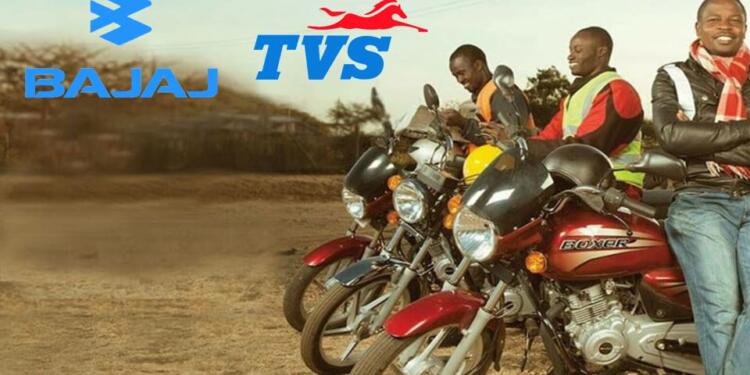Ever since, it was launched, Chinese Belt and Road initiative (BRI) was a thorn for the experts concerned with India’s soft power status in Africa. But, very few of them thought that the effect could be effectively countered without putting much foot in the continent. Bajaj and TVS, two of the premier bike brands have contributed immensely in this direction.
TVS and Bajaj are dominating Africa
The ever reliable bike brands in India are now helping India increase its inroads into African continent. According to latest numbers, only two Indian companies have been able to drive out 160 Chinese motorbike companies from Africa. In terms of market share, just Bajaj and TVS have captured as much African market as 40 Chinese companies combined have done.
In fact, Bajaj features among the top 2 bike sellers in more than a dozen African markets. The company has sold anywhere between 2.4 and 2.7 million two-wheelers in African continent. Out of 50 percent market shared held by Indian two-wheelers, Bajaj alone captures 40 per cent of African market. Its growth is astounding as well. On CAGR basis, it is registering double digit growth.
On the other hand, the sale of TVS bikes in Africa has also witnessed a remarkable upsurge. The increased penetration in countries like Guinea, Kenya, and Nigeria among others has helped TVS clock a growth rate of CAGR of 35 per cent per annum. Both the aforementioned companies in fact sell their bikes on hybrid dealership. A fixed percentage of bikes are directly imported by India, while rest of the demand is met by local assembly plants as well.
Read more: TVS further boosts EV revolution, acquires a major stake in Swiss E-Mobility Group
Africans’ quest for bikes
But, the larger question still remains. And that is, how were Indian companies able to pip the Chinese in such a drastic fashion? If you watch closely, then you will notice that Indian companies increased their presence in a rapid pace which was only matched by Chinese companies establishing themselves in other countries in the past. Apparently, Indian companies beat them in their own merry way. But, Chinese companies have no one else to blame. They are the one who gave the space to India. Let’s see how this panned out.
Africa is still not a healthy place to live by modern standards. The poverty rate is amongst the highest in the world. Most of the modernisation efforts have fallen flat on their face. Even today, the distance between hospitals and people is a reason for concern. The primary reason is that the infrastructure is bad. This is exacerbated by corruption. All these factors lead to the roads being substandard in nature. Add to that, the low per capita income of Africans. Combined, all these factors did not provide people with much leeway to buy good quality vehicles operating on fossil fuels.
The race between Chinese and Japanese companies
Bike manufacturing companies needed a market and Africa was the prime one. In the beginning of 21st century, Japanese and Chinese companies started to flood the African market. Out of these two, Japanese bikes were much better in quality.
But, there was problem. They were much expensive and Africans could not afford it. So, naturally, Chinese bikes started to occupy the empty market space. China exported its bike parts in boxes. People used to buy them and then take it to the local assemblers to compile them and provide them with final product.
Slowly, they started to realise the fallacy of buying cheap Chinese imports. The bikes were not reliable for African roads. Their parts started to break down at crucial junctures. Adding insult to the injury, China did not provided after sales service and repair. Over a period of time, the toy named ‘bike repairing’ started to cost more than the child itself, the child being ‘bikes’. No business idea can sustain on that for a long time.
Indian bike makers emerged as winner
This is exactly what happened. Indian companies started to take-over the vacated space. Indian bikes cost more compared to Chinese ones, but very less compared to Japanese ones. But, their quality is on par with Japanese bikes. It provided a viable opportunity to African customers. They could now buy bikes at much lower costs. Indian bikes were exactly what Africans needed.
Africans are not much interested in private ownership of two wheelers. They buy bikes for investment purposes. Yes, in most of the African countries, bikes have more commercial use than personal. The bikes in Africa are known as Boda Boda. They are used for transporting people and goods from one place to another (just like rapido, uber auto among others in India). The penetration of roads is so bad that sometimes, the owners of these Boda-Boda also convert their bikes into Ambulances.
Read more: Rahul Bajaj – The License Era Businessman whose sense of entitlement knew no bounds
Boxer’s success and road ahead
Bajaj and TVS came and provided people with affordable, easy to purchase and low maintenance bikes. Moreover, they were supplied to Africa in assembled state. Later, companies also opened their dealership, assembly line and service centres in these locations. Bajaj boxer turned out to be the biggest beneficiary of this influx. It has 10 assembly facilities assisted by more than a dozen distributors in the whole continent. It sells twice the amount of bikes sold by its nearest competitor.
Detailing Bajaj’s success mantra in African continent, Rakesh Sharma, executive director said, “Bajaj has been able to compete and win in Africa based on its product strengths, local assembly operations … quality assurance, network of distribution partners, dealers and service centres. With a long-term focus, a huge effort has been put in training tens of thousands of mechanics and establishing customer engagement programmes, which is yielding results.”
Read more: KTM’s E-Bikes will be 100% Made in India
However, this is just a start. African continent has just started to catch up with the modern world. Their full economic might is still an unchartered territory. According to an estimate, with a CAGR of 4.72 per cent, the two-wheeler market is expected to reach $2793.65 million by 2026. It will also result in diversification of the market. Soon, Boda Boda will no longer be needed and fancy bikes will become trend in the continent.
Indian companies have already established goodwill in the region. They need to capitalise on it and prepare Africans for better bikes.

























